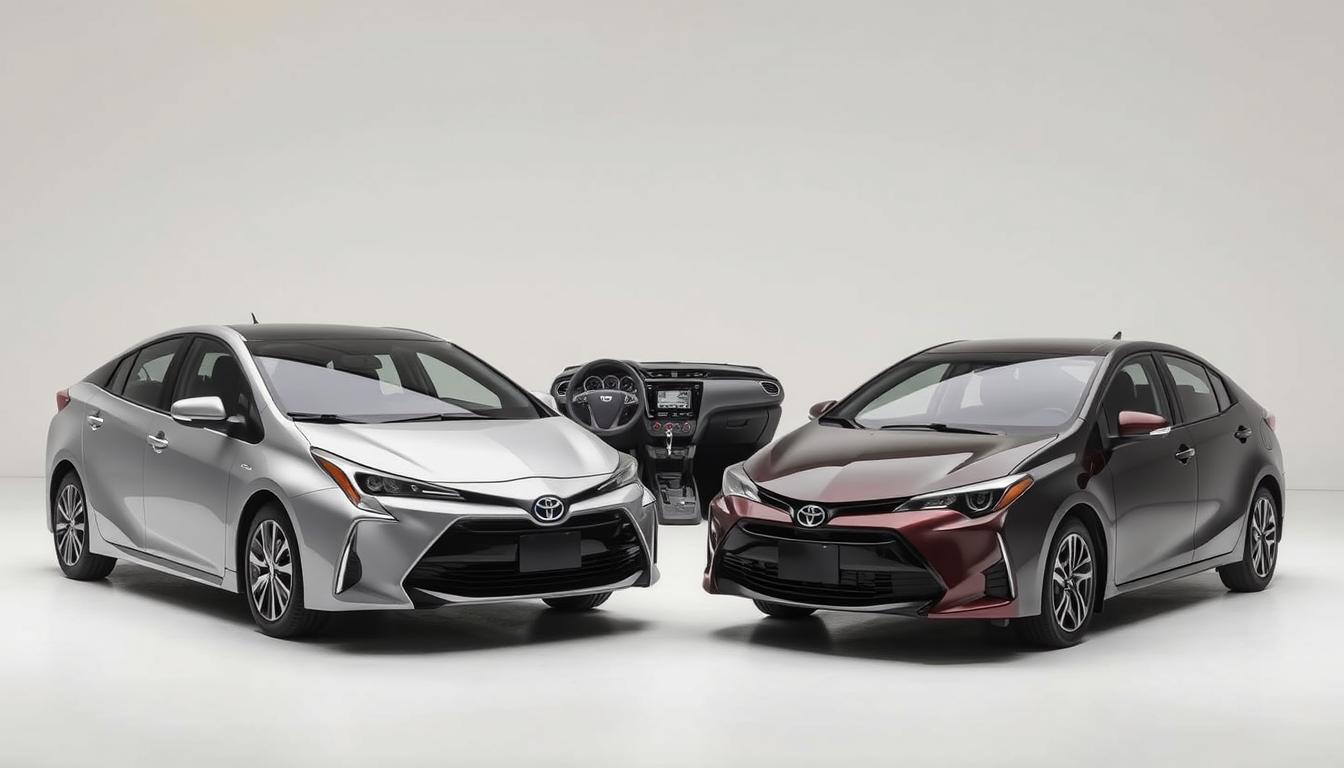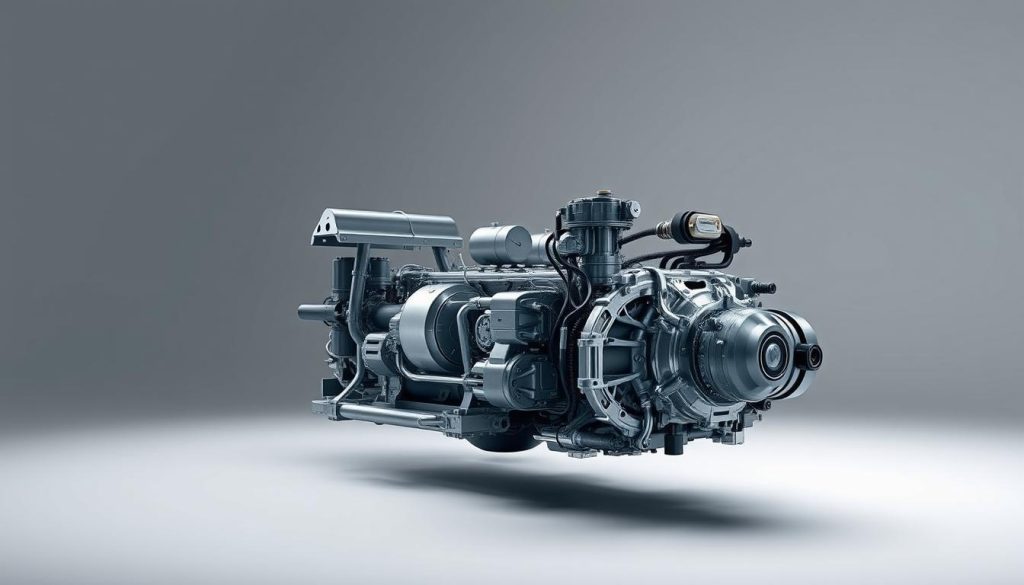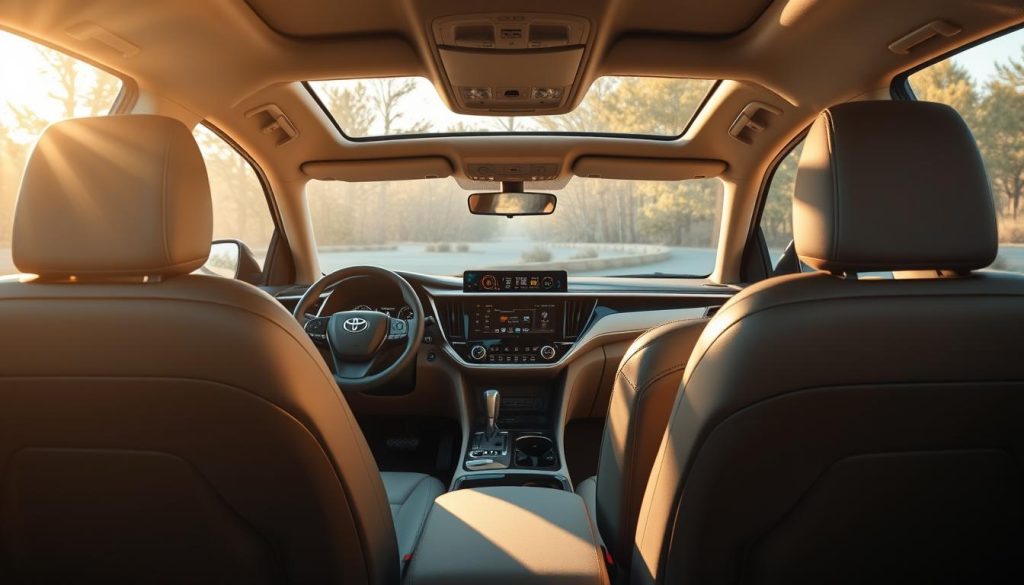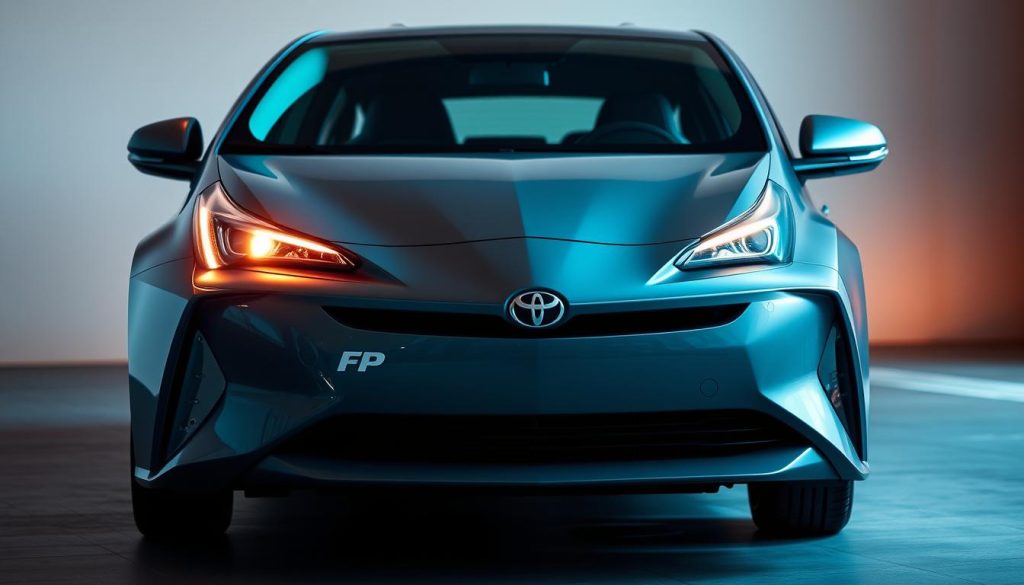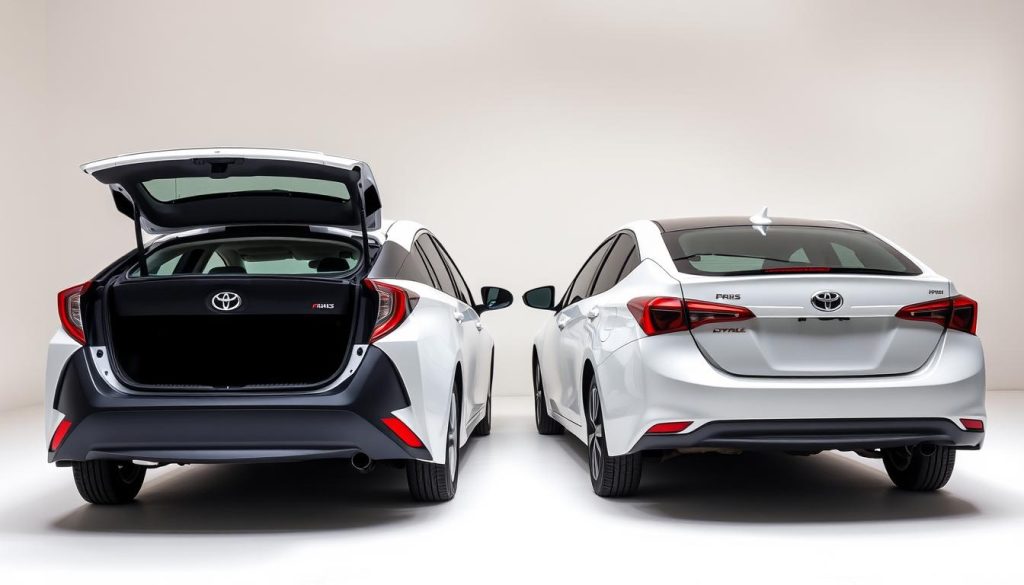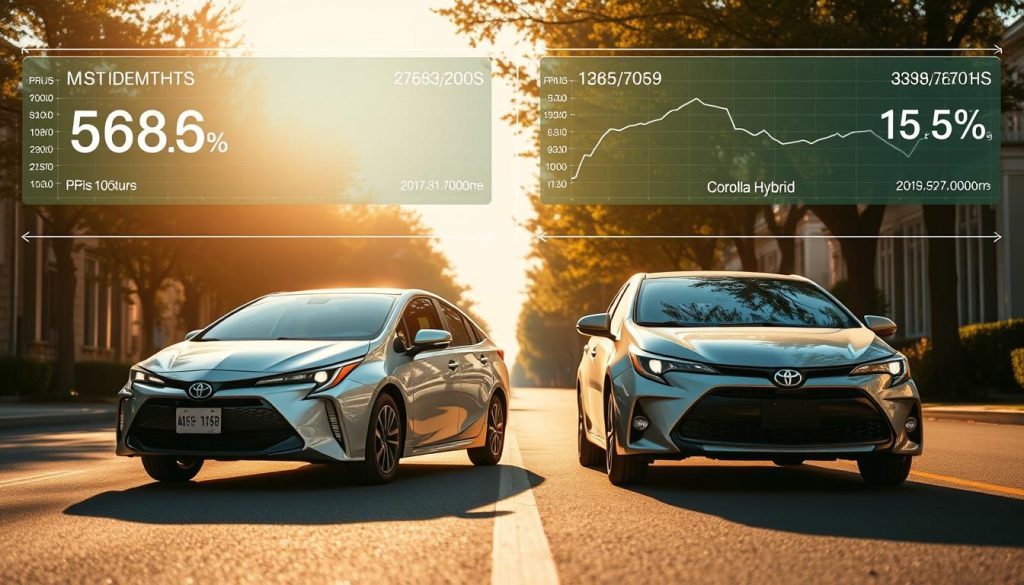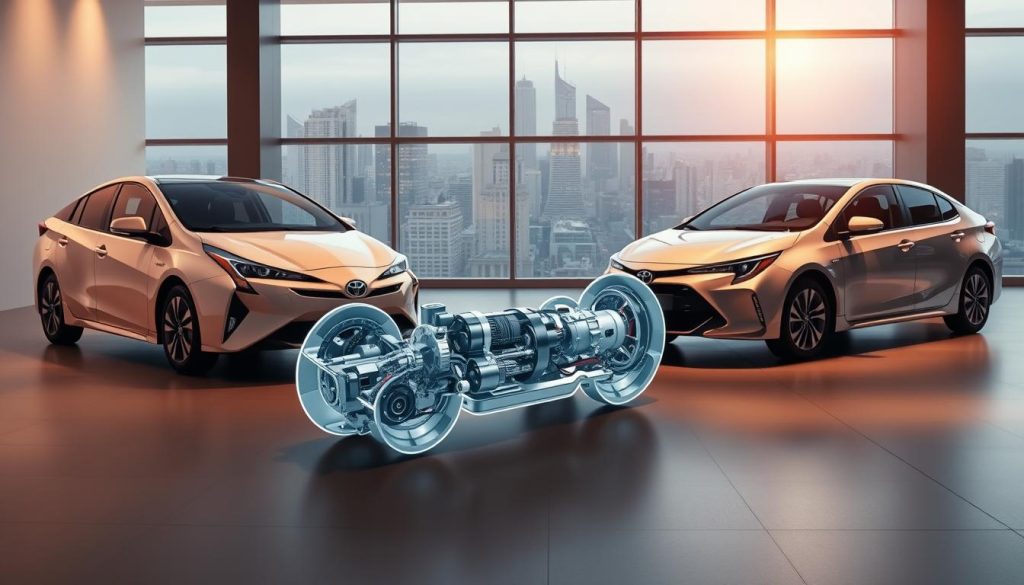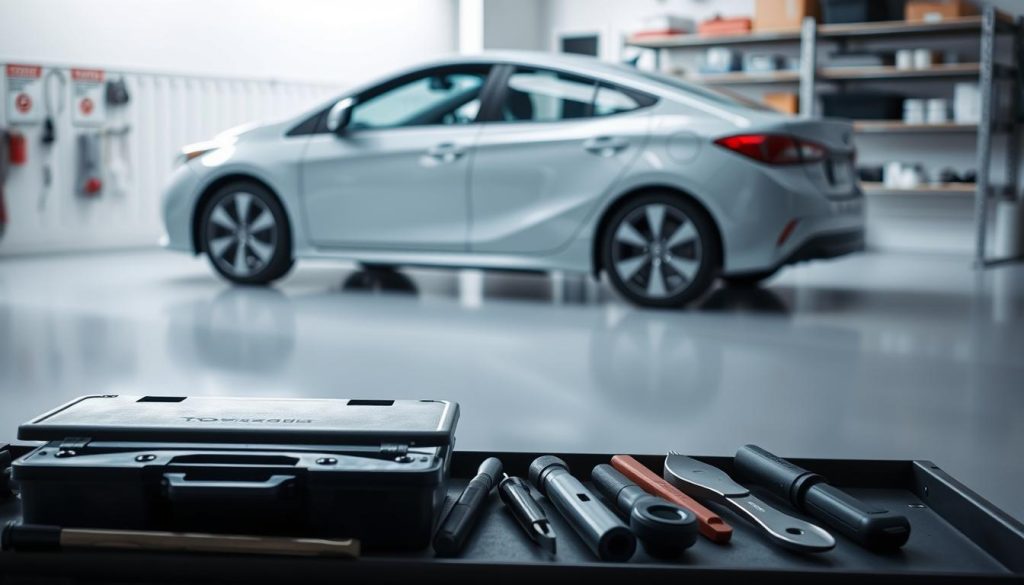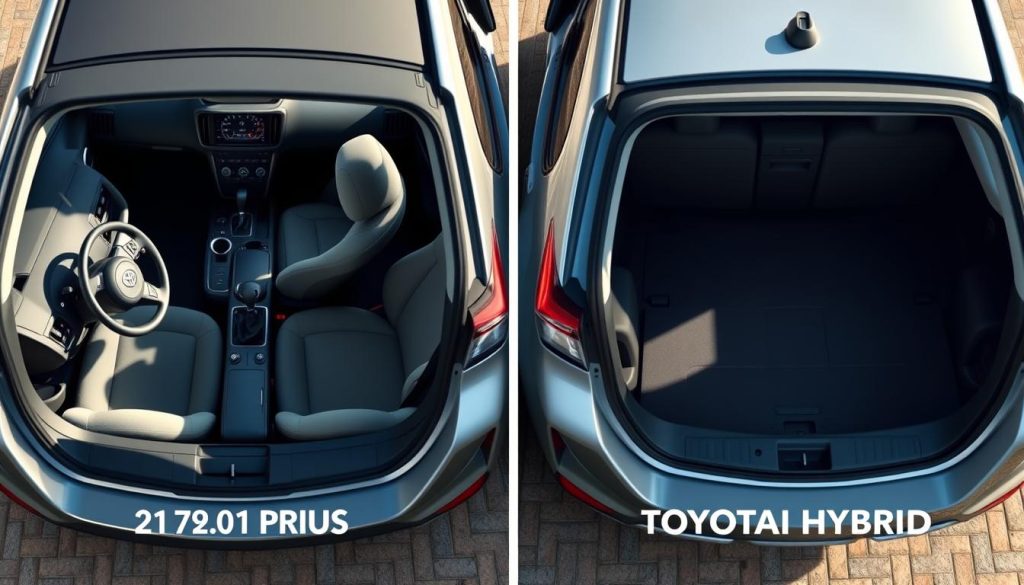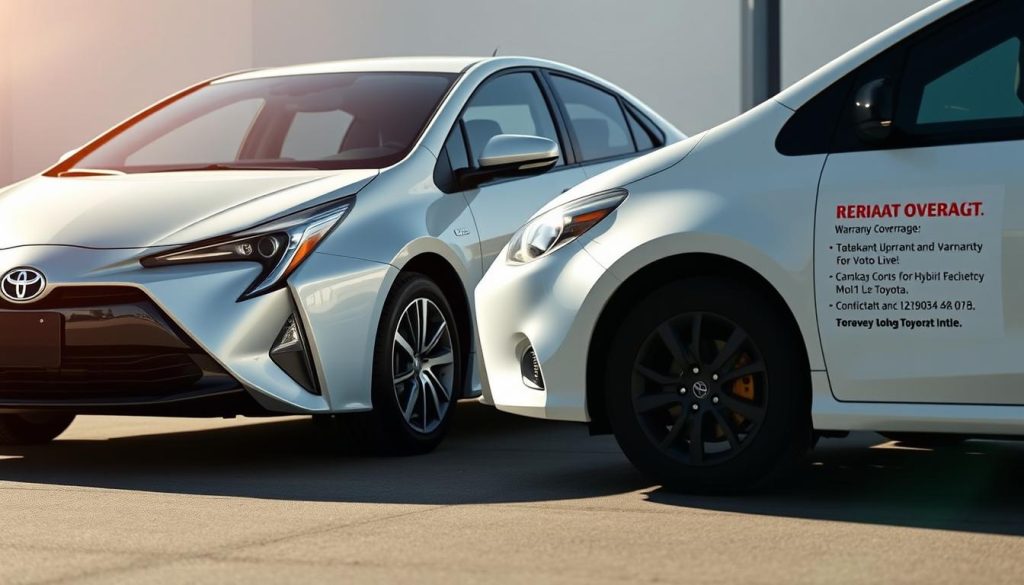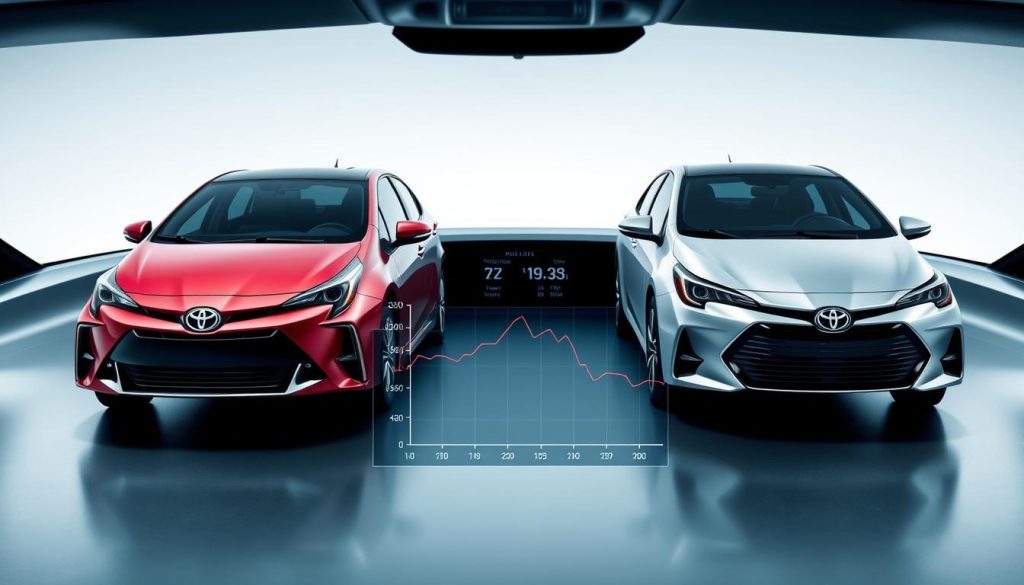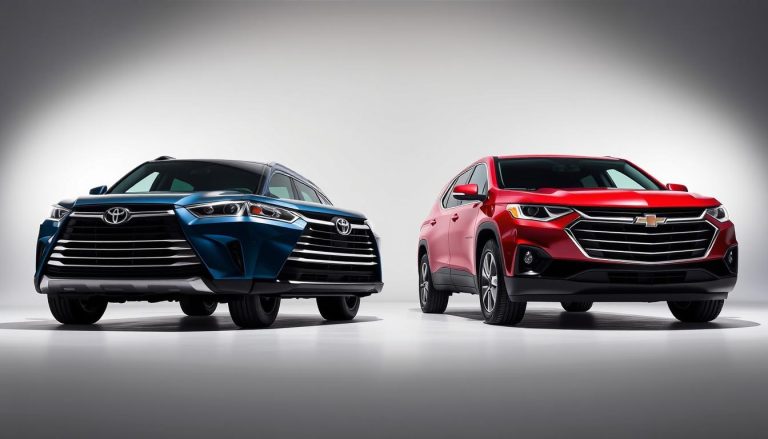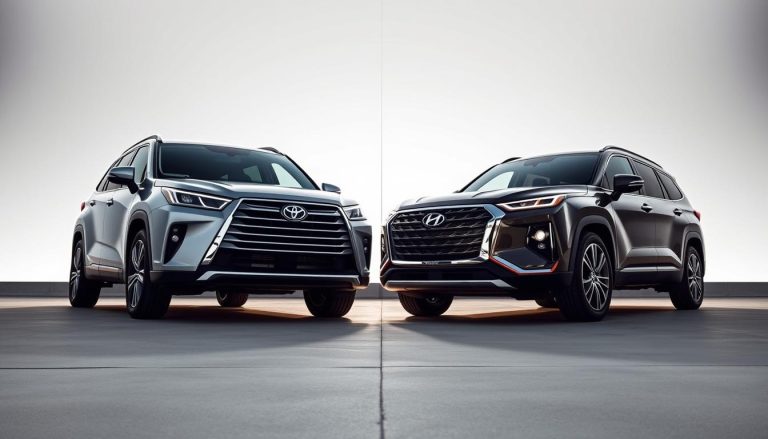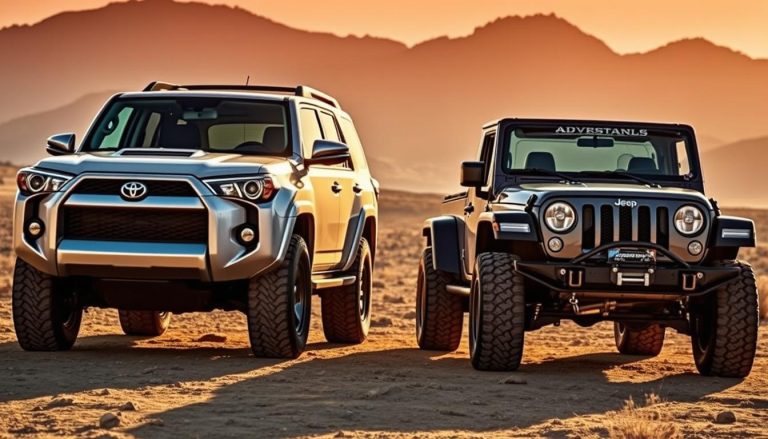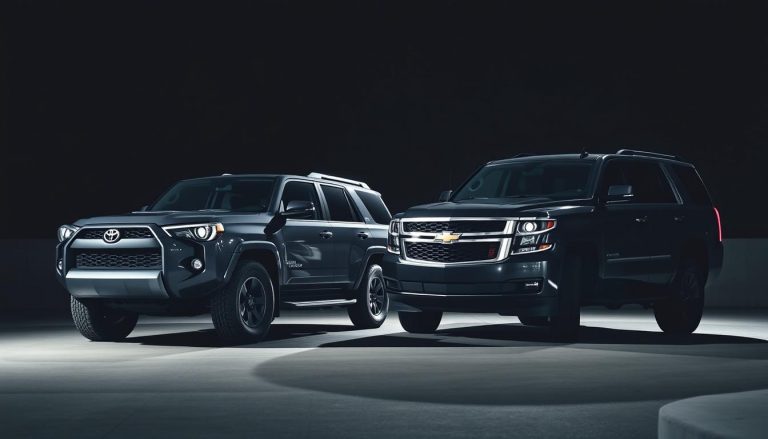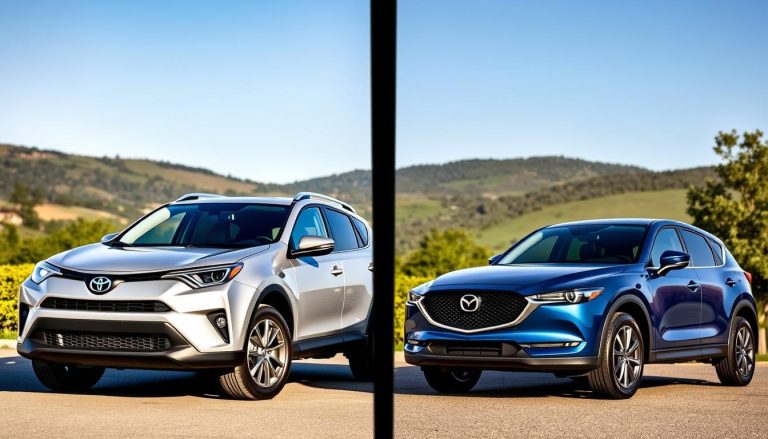Toyota Prius vs Corolla Hybrid: Which Should You Choose?
Choosing the right hybrid car can seem overwhelming. Toyota hybrids lead the way in eco-friendly driving. The Prius and Corolla hybrid are top picks for those who care about the planet and their wallet.
The 2025 models show Toyota’s dedication to saving fuel and looking good. Each car has its own strengths. So, deciding between them is more than just a choice.
Our detailed comparison will cover performance, cost, tech, and how easy they are to use. We aim to find the perfect hybrid for you. Whether you’re driving to work or on a weekend trip, these cars promise fun and fuel efficiency.
Are you ready to find your ideal Toyota hybrid? Let’s look at the specifics. We’ll guide you to the car that fits your needs and wants.
Overview of Toyota’s Hybrid Lineup
Toyota is a leader in hybrid technology, changing the car world with its green vehicles. The Toyota hybrid lineup is a big step towards better transportation. It combines new engineering with care for the environment.
Toyota started its hybrid journey with a big dream to change how we travel. The first Prius came out in 1997. Ever after, Toyota has kept making hybrids better.
Evolution of Hybrid Technology
Toyota’s hybrid tech has changed a lot in 20 years. The main changes are:
- 1997: First-generation Prius launches in Japan
- 2003: Hybrid technology expands to global markets
- 2019: Corolla Hybrid enters the compact hybrid segment
- 2022: Advanced hybrid powertrains with improved efficiency
Market Position of Hybrid Models
The Toyota hybrid lineup meets many needs. It has everything from small sedans to big SUVs. All of them are good for the planet.
| Model | Segment | Hybrid Introduction | Key Characteristics |
|---|---|---|---|
| Prius | Compact Hybrid | 1997 | Pioneering hybrid technology |
| Corolla Hybrid | Compact Sedan | 2019 | Affordable hybrid option |
| RAV4 Hybrid | Compact SUV | 2016 | Versatile crossover performance |
Key Differences at a Glance
The Prius and Corolla Hybrid both use Toyota’s hybrid tech. But they are for different drivers. The Prius is all about being a hybrid, while the Corolla Hybrid is a more normal car that also saves fuel.
Toyota keeps making hybrids better. This makes driving green cars more fun and easy for more people.
Price Comparison and Value Proposition
Choosing between fuel-efficient cars can be tough, like picking between Toyota’s popular hybrids. The 2025 Toyota Corolla Hybrid and Prius are great options for those who care about the environment. They have different prices.
The Corolla Hybrid is a good choice for those watching their budget. It starts at $23,825 for the LE model. This makes it a more affordable hybrid option. On the other hand, the Prius starts at $28,350 for its LE trim. This is a bit more expensive.
| Model | Base Trim | Starting Price | Key Advantages |
|---|---|---|---|
| Corolla Hybrid | LE | $23,825 | Lower entry cost, practical design |
| Prius | LE | $28,350 | Advanced styling, higher tech features |
When looking at these cars, think about more than just the price. The Corolla Hybrid has:
- Lower upfront cost
- Excellent fuel economy
- Reliable Toyota engineering
The Prius, though more expensive, offers:
- More advanced technological features
- Distinctive aerodynamic design
- Slightly higher efficiency ratings
Buyers should think about their budget and what they want in a car. The Corolla Hybrid is a great deal for those who want a good price without giving up on hybrid tech.
Exterior Design and Styling Differences
The Prius and Corolla Hybrid show Toyota’s dedication to green cars. They have unique designs that mix efficiency with modern looks. These cars stand out in the hybrid market with their innovative styles.
Front Fascia and Lighting Design
Toyota’s design philosophy is clear in the front looks of these hybrids:
- Prius has a bold, futuristic grille
- Corolla Hybrid has a more classic front look
- Both use LED lights for better looks and visibility
Body Dimensions and Aerodynamics
| Dimension | Prius | Corolla Hybrid |
|---|---|---|
| Length | 181.1 inches | 182.5 inches |
| Width | 70.2 inches | 70.1 inches |
| Height | 55.9 inches | 56.5 inches |
Wheel Options and Rear Design
Each car has its own wheel designs that match its look:
- Prius has more modern alloy wheels
- Corolla Hybrid has more traditional wheels
- The rear looks show each car’s unique brand style
The designs show Toyota’s creative take on green cars. They mix aerodynamics with beauty.
Performance Specifications
Toyota’s hybrid powertrain technology makes the Prius and Corolla Hybrid models exciting to drive. These cars are fuel-efficient and offer a balance of power and efficiency.
- Front-Wheel Drive (FWD): 2.0-liter hybrid four-cylinder engine generating 194 horsepower
- All-Wheel Drive (AWD): Slightly enhanced 2.0-liter hybrid four-cylinder engine producing 196 horsepower
The Corolla Hybrid takes a more conservative approach. It has a 1.8-liter hybrid four-cylinder engine. This engine delivers 138 horsepower, making it great for smooth urban driving.
| Model | Engine Size | Horsepower | Drivetrain |
|---|---|---|---|
| Prius FWD | 2.0-liter | 194 hp | Front-Wheel Drive |
| Prius AWD | 2.0-liter | 196 hp | All-Wheel Drive |
| Corolla Hybrid | 1.8-liter | 138 hp | Front-Wheel Drive |
The Prius offers more powerful options, while the Corolla Hybrid is reliable and economical for city driving. Toyota aims to make versatile fuel-efficient cars for everyone.
Prius vs Corolla Hybrid: Power and Efficiency
When we look at the Prius vs Corolla hybrid, power and efficiency are key. Toyota’s hybrids lead in fuel economy, with impressive MPG ratings. This makes them stand out in the hybrid market.
The 2025 Prius LE FWD has a 57 mpg combined rating. This shows Toyota’s dedication to saving fuel. On the other hand, the Corolla Hybrid LE FWD offers a 50 mpg combined rating. It’s a great mix of performance and economy.
- Prius LE FWD: 57 mpg combined
- Corolla Hybrid LE FWD: 50 mpg combined
Looking at performance, the Prius has a slight edge in efficiency. It’s perfect for those who want to save the most on fuel. The Corolla Hybrid, while less efficient, provides a more traditional driving experience. It’s great for those who prefer a familiar feel.
Fuel efficiency isn’t just about numbers—it’s about real-world driving experience and long-term savings.
Drivetrain options are important when comparing the Prius vs Corolla hybrid. Buyers should think about their driving habits and preferences. This will help them choose the right hybrid for them.
Interior Quality and Materials
Toyota is all about eco-friendly cars, and it shows in the Prius and Corolla Hybrid’s interiors. These cars blend comfort, function, and green thinking in their design.
Dashboard Layout: Modern Meets Practical
The dashboards of these hybrids are quite different. The Prius has a sleek, asymmetrical design for tech lovers. On the other hand, the Corolla Hybrid has a classic, easy-to-use layout.
- Prius: Digital-focused display with unique central instrument cluster
- Corolla Hybrid: Classic layout with straightforward instrumentation
- Both models feature eco-driving information displays
Seating Materials and Comfort
Comfort is key in these green cars. Toyota offers various seats to fit everyone’s taste:
- Cloth upholstery in base models
- Premium leatherette in higher trims
- Supportive seat designs with ergonomic considerations
Interior Storage Solutions
The storage in these hybrids is both smart and practical. They have clever spots and systems to keep your stuff organized.
- Multiple center console storage options
- Spacious door pocket designs
- Flexible cargo management systems
Toyota’s focus on green cars doesn’t mean they forget about comfort or style. The interiors show their commitment to both.
Technology and Infotainment Features
Toyota’s hybrid technology changes the way we drive in the Prius and Corolla Hybrid. These green cars offer top-notch connectivity and digital interfaces. They are perfect for those who care about the environment.
The infotainment systems in these cars are quite different. They have unique screens and user experiences:
- Prius: 12.3-inch high-resolution display on premium trims
- Corolla Hybrid: Consistent 8-inch touchscreen across all models
- Both models support wireless Apple CarPlay and Android Auto
Toyota shows its dedication to green transportation and modern tech through these features:
| Feature | Prius | Corolla Hybrid |
|---|---|---|
| Screen Size | 12.3-inch (upper trims) | 8-inch (all trims) |
| Wireless Connectivity | Apple CarPlay/Android Auto | Apple CarPlay/Android Auto |
| Digital Assistant | Enhanced Voice Control | Standard Voice Recognition |
Toyota Safety Sense 3.0 is standard in both cars. It combines hybrid tech with advanced safety systems. These features make driving safer and show a big leap in green tech.
Drivers get smooth smartphone integration, easy-to-use interfaces, and advanced tech support. This makes every trip more connected and fun.
Safety Features and Ratings
Toyota hybrids focus on safety in their eco-friendly lineup. The Prius and Corolla Hybrid show Toyota’s dedication to safety. They use advanced tech and systems to protect everyone inside.
Standard Safety Equipment
Both Toyota hybrids have Toyota Safety Sense 3.0. This package includes:
- Pre-Collision System with Pedestrian Detection
- Dynamic Radar Cruise Control
- Lane Departure Alert
- Automatic High Beams
- Road Sign Assist
Crash Test Performance
Safety ratings are key for those looking at eco-friendly vehicles. The Corolla Hybrid got the IIHS Top Safety Pick award. The Prius got mixed ratings in some crash tests.
“Safety isn’t an option—it’s a standard feature in Toyota’s hybrid lineup.” – Toyota Safety Engineering Team
Advanced Driver Assistance Systems
Toyota’s systems make these cars smart and safe. Lane tracking, adaptive cruise control, and emergency braking add extra safety. They give drivers more confidence on the road.
When choosing a Toyota hybrid, look at safety ratings and features. Pick the one that fits your safety needs best.
Cargo Space and Practicality
When looking at fuel-efficient cars like the Toyota Prius and Corolla Hybrid, cargo space is key. The Prius vs Corolla comparison shows big differences in how much you can store. These differences can affect how useful the car is every day.
The 2025 Prius has a hatchback design that offers 23.8 cubic feet of cargo room. This big space makes the Prius great for:
- Weekend getaways
- Grocery shopping
- Transporting sports equipment
- Business travel needs
On the other hand, the Corolla Hybrid has a smaller trunk with 13.1 cubic feet of space. Though it’s smaller, it’s good for daily trips and city driving.
| Vehicle Model | Cargo Space | Best Suited For |
|---|---|---|
| Toyota Prius | 23.8 cubic feet | Long trips, large items |
| Corolla Hybrid | 13.1 cubic feet | Daily commutes, city driving |
Your lifestyle and storage needs will decide which car is best for you. The Prius is better for those needing more space. The Corolla Hybrid is great for those who prefer less clutter.
Fuel Economy Comparison
Green transportation is key for drivers wanting to cut down on carbon emissions. Toyota’s hybrid models, the Prius and Corolla Hybrid, lead in fuel efficiency. They offer great MPG ratings, making them top picks for those caring about the environment.
City and Highway MPG Ratings Breakdown
The MPG ratings of these hybrids are impressive:
- Prius LE FWD: 57 city / 56 highway / 57 combined mpg
- Corolla Hybrid LE FWD: 53 city / 46 highway / 50 combined mpg
Real-World Fuel Efficiency Insights
The MPG ratings show a big commitment to green driving. The Prius has a slight edge, mainly in city driving. Drivers can enjoy great efficiency and save on fuel costs.
Fuel efficiency isn’t just about saving money—it’s about reducing environmental impact with every mile driven.
Real-world fuel efficiency depends on several things:
- Driving habits
- Road conditions
- Vehicle maintenance
- Weather conditions
Both models show Toyota’s dedication to making hybrids that save money and the planet.
Driving Experience and Handling
When you compare the Prius and Corolla hybrids, you’ll see big differences in how they drive. Each model has a unique hybrid powertrain. This makes them stand out in city and highway driving.
The Prius has a more powerful hybrid setup, making 194 horsepower for front-wheel drive. This means it accelerates faster and feels more dynamic. Drivers will enjoy a more engaging ride with better handling.
- Prius Hybrid Powertrain Highlights:
- 194 hp total system output
- Enhanced acceleration
- Wider track and longer wheelbase
- Corolla Hybrid Performance Characteristics:
- 138 hp total system output
- Smooth, efficient driving experience
- Compact and nimble handling
In everyday driving, the Prius feels sportier thanks to its advanced hybrid. Its wider track and longer wheelbase help with stability and cornering. On the other hand, the Corolla hybrid is all about smoothness and fuel savings.
It’s a good idea to try out both cars to see the differences. The Prius is for those who want a sportier drive. The Corolla is perfect for those who value balance and practicality.
Maintenance and Reliability
Toyota hybrids are known for being reliable and easy on the wallet. The Prius and Corolla Hybrid show Toyota’s dedication to green cars that need little upkeep.
Toyota hybrid owners enjoy several benefits:
- Less brake wear thanks to regenerative braking
- Long-lasting hybrid batteries
- Lower maintenance costs than gas cars
- Longer service intervals
“Toyota’s hybrid technology represents a breakthrough in vehicle reliability and efficiency.” – Automotive Engineering Review
The hybrid parts in Toyota cars are built to last. Most hybrid batteries can go 10-15 years or 150,000-200,000 miles before needing a replacement.
| Maintenance Aspect | Prius | Corolla Hybrid |
|---|---|---|
| Average Annual Maintenance Cost | $408 | $392 |
| Recommended Service Intervals | Every 10,000 miles | Every 10,000 miles |
| Hybrid Battery Warranty | 10 years/150,000 miles | 10 years/150,000 miles |
Eco-friendly vehicles from Toyota are not just environmentally conscious but also engineered for long-term dependability. Regular maintenance and following manufacturer recommendations will ensure optimal performance and longevity.
Interior Space and Comfort Metrics
When we look at fuel-efficient cars like the Prius and Corolla Hybrid, space inside matters a lot. It affects how comfortable drivers and passengers feel. These Toyota models compete not just in fuel economy but also in how they fit people and stuff.
The Prius vs Corolla comparison shows some big differences in space. These differences can really change how you feel while driving.
Passenger Room Dimensions
Being roomy is key for comfort in these hybrid cars. The newest models have a lot of room inside:
- Prius has 91.2 cubic feet of total passenger volume
- Corolla Hybrid has 88.6 cubic feet of passenger space
- Front legroom: Prius has 43.2 inches, Corolla has 42 inches
Seating Configuration Options
Both cars offer flexible seating, but they’re a bit different:
- Prius: Has a more sloping roofline, less rear headroom
- Corolla Hybrid: Has a more traditional sedan look, balanced space
- Both offer 5-passenger seating
Choosing between these Toyota hybrids depends on what you value more: comfort or space.
Warranty Coverage and Service Plans
Toyota hybrids come with a full warranty, giving owners peace of mind. The warranty covers both the Prius and Corolla Hybrid. It protects against defects and issues with vehicle components.
The warranty package for these Toyota hybrids includes:
- Basic Vehicle Warranty: 3 years or 36,000 miles
- Powertrain Warranty: 5 years or 60,000 miles
- Hybrid-Specific Component Warranty: 8 years or 100,000 miles
These eco-friendly vehicles get extra protection for key hybrid parts. The hybrid-specific warranty shows Toyota’s trust in their hybrid tech. It covers the battery, electric motor, and other vital hybrid parts.
Toyota also has service plans for extra protection. These plans offer flexibility for those wanting more coverage. Buyers can pick from various extended warranty options to enhance their vehicle’s original warranty.
Toyota’s warranty shows their dedication to quality and customer happiness in eco-friendly vehicles.
Buying a Toyota hybrid means getting great warranty coverage. The Prius and Corolla Hybrid have similar warranties. This gives buyers confidence in their choice.
Resale Value and Long-Term Ownership Costs
Toyota’s hybrid models are top picks for fuel-efficient cars. They offer great long-term value. The Prius and Corolla Hybrid give financial benefits that last long after you buy them.
Resale value is key for those looking at green transportation. Toyota hybrids hold their value well. This means big savings for future owners:
- Prius retains about 50-55% of its value after five years
- Corolla Hybrid keeps around 45-50% of its value
- They depreciate less than regular gas cars
Looking at long-term costs shows big savings. Fuel efficiency is a big reason. Prius owners save about $3,500 in fuel over five years. The Corolla Hybrid offers similar savings.
| Cost Factor | Prius | Corolla Hybrid |
|---|---|---|
| Annual Fuel Cost | $750 | $800 |
| 5-Year Maintenance | $2,500 | $2,300 |
These cars are more than just a way to get around. They’re smart financial choices in green technology.
Conclusion
When looking at Toyota hybrids, the Prius and Corolla offer different benefits. The 2025 Prius is more powerful and spacious. It has better fuel efficiency and a modern design that tech lovers will enjoy.
The Corolla Hybrid is great for those watching their budget. It has a lower starting price and a classic look. It’s perfect for those who want reliable, affordable transportation without giving up on economy.
Choosing between the Prius and Corolla depends on what you value most. Think about your budget, how you drive, your design preferences, and what you need from a car. Test driving both will show you which one fits your lifestyle best.
Both hybrids have their own strengths, making sure there’s a Toyota hybrid for everyone. Your perfect hybrid is out there. It’s just a matter of finding the one that matches your driving needs.
FAQ
What are the main differences between the Toyota Prius and Corolla Hybrid?
The Prius is a dedicated hybrid hatchback with a futuristic look. It has more cargo space. The Corolla Hybrid is a traditional sedan with a smaller interior.
Which hybrid is more fuel-efficient?
The Prius usually has better fuel economy, with EPA ratings around 54-58 mpg combined. The Corolla Hybrid gets 52-53 mpg combined. Both are great for saving fuel.
How do the prices compare between the Prius and Corolla Hybrid?
The Corolla Hybrid is cheaper, starting at ,000-,000. The Prius starts at about ,000-,000, depending on the trim and features.
Which model is better for families?
The Prius has more cargo space and a versatile hatchback design. It’s better for families needing extra storage. The Corolla Hybrid is more traditional, fitting those who prefer a standard sedan.
Are there all-wheel drive options for these hybrids?
The Prius has an AWD-e option on some trims. The Corolla Hybrid is front-wheel drive only. The Prius AWD-e offers better traction in various weather.
How reliable are these Toyota hybrid models?
Both models are known for Toyota’s hybrid reliability. Toyota has over two decades of hybrid experience. They get high marks for dependability and low maintenance costs.
What is the warranty coverage for these hybrids?
Toyota offers a detailed hybrid warranty. This includes an 8-year/100,000-mile hybrid battery warranty and a 5-year/60,000-mile powertrain warranty. There’s also a 3-year/36,000-mile basic warranty for both models.
Which hybrid is more environmentally friendly?
Both models are eco-friendly with low emissions and high fuel efficiency. The Prius has a slightly lower carbon footprint due to better fuel economy and design.
How do the performance characteristics differ?
The Prius has more power and a unique driving experience. The Corolla Hybrid offers a more conventional driving feel, similar to a traditional sedan.
Can I get advanced safety features on both models?
Yes, both the Prius and Corolla Hybrid come with Toyota Safety Sense 2.0. This includes features like adaptive cruise control, lane departure alert, and a pre-collision system with pedestrian detection.

